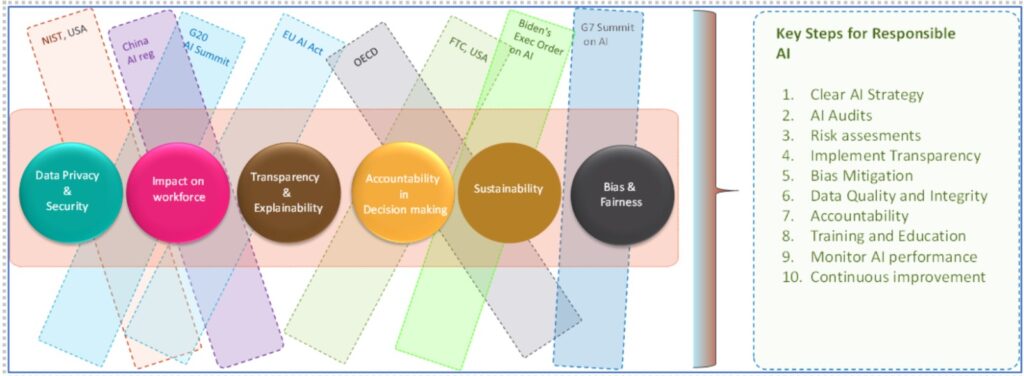Ethical Considerations in AI Automation: Balancing Efficiency with Responsibility
By vitasolutions / 21 November 2024
In today’s fast-paced digital era, AI-driven automation is revolutionizing industries across the globe. From streamlining operations to boosting productivity, the potential for AI to increase efficiency is undeniable. However, with great power comes great responsibility, and as businesses increasingly rely on AI for automation, it’s crucial to address the ethical implications that come with it.
At VITA Solutions, we believe that while AI can unlock immense value and transformative possibilities, its deployment must be guided by ethical principles. This blog will explore the key ethical considerations in AI automation and discuss how businesses can balance efficiency with responsibility.
1. Transparency and Explainability
One of the foundational principles of ethical AI is transparency. AI systems, especially those involved in decision-making, should be understandable by humans. As AI automates more complex tasks, it becomes increasingly important for businesses to ensure that decisions made by AI systems are explainable to stakeholders.
For example, if an AI algorithm is used to determine loan eligibility or job candidacy, it’s essential that the individuals affected by these decisions understand how and why the system reached its conclusions. Without transparency, there’s a risk of perpetuating bias or discrimination, leading to a loss of trust.
2. Bias and Fairness
AI systems are only as good as the data they are trained on. If the data contains biases, the AI will likely reproduce and even amplify those biases. This can have serious ethical implications, particularly when it comes to automating processes like hiring, lending, or criminal justice.
To ensure fairness, businesses must take proactive steps to audit and test their AI systems for bias. This includes using diverse datasets and continually monitoring outcomes to identify any unintended discriminatory patterns. By prioritizing fairness, companies can avoid reputational damage and legal risks while fostering an environment of inclusion and equality.
3. Data Privacy and Security
As AI automation relies heavily on data, concerns about data privacy and security are at the forefront of ethical discussions. The collection, storage, and processing of large amounts of personal data must be handled responsibly. Businesses must comply with data protection regulations like GDPR and ensure that data is used in a way that respects individuals’ privacy rights.
Implementing strong data encryption, anonymization techniques, and giving users control over their data are just a few ways companies can safeguard privacy. Ethical AI automation should prioritize the security of sensitive information to protect both the business and the individuals it serves.
4. Impact on Employment and Workforce
AI automation has the potential to significantly disrupt the labor market. While it can lead to increased efficiency and lower operational costs, it also raises concerns about job displacement. The automation of repetitive or routine tasks can reduce the demand for certain roles, leading to workforce challenges.
Businesses must approach automation with a mindset of responsibility towards their employees. This could involve retraining and upskilling workers for new roles that leverage human creativity, emotional intelligence, and complex problem-solving—skills that AI cannot replicate. Companies that focus on creating a balance between automation and human collaboration will contribute to a more sustainable workforce.
5. Accountability in Decision-Making
When AI automates decision-making processes, the question of accountability becomes a pressing concern. Who is responsible if the AI makes a mistake or causes harm? Ethical AI automation demands clear guidelines on accountability.
Businesses must establish protocols to ensure that human oversight is integrated into AI-driven processes. By creating a system of checks and balances, companies can ensure that AI decisions are reviewed and validated by human experts, reducing the risk of harm and ensuring accountability.
6. Sustainability and Environmental Impact
AI systems require vast amounts of computational power, which can lead to significant environmental costs in terms of energy consumption. The ethical deployment of AI automation includes considering its environmental impact and finding ways to reduce its carbon footprint.
Companies can invest in more energy-efficient technologies, leverage cloud computing solutions that prioritize sustainability, or adopt AI techniques that minimize resource usage. By balancing efficiency with environmental responsibility, businesses can align their automation efforts with global sustainability goals

Key Steps in Implementing Responsible AI
Clear AI Strategy: Develop a roadmap to integrate AI technologies aligned with business goals, ethical principles, and regulatory compliance, ensuring strategic foresight and responsible decision-making.
AI Audits: Regularly assess AI models for fairness, accuracy, compliance, and transparency to detect potential issues, errors, or ethical risks before and during deployment.
Risk Assessments: Identify and evaluate risks associated with AI systems, such as data privacy, security, and unintended biases, to develop appropriate mitigation strategies.
Implement Transparency: Ensure AI systems’ decision-making processes are understandable, traceable, and open for review by stakeholders to build trust and accountability.
Bias Mitigation: Identify, measure, and reduce bias within AI algorithms and training data to promote fairness and avoid discriminatory outcomes.
Data Quality and Integrity: Maintain high-quality, accurate, and representative datasets to ensure AI models generate reliable, unbiased, and valid outputs.
Accountability: Establish clear roles and responsibilities within the organization to ensure ownership and accountability for AI outcomes and any related ethical concerns.
Training and Education: Provide employees and stakeholders with the necessary knowledge, tools, and ethical guidelines to properly understand and manage AI systems.
Monitor AI Performance: Continuously track AI systems’ outputs to detect changes, errors, or deviations in performance over time, enabling timely interventions.
Continuous Improvement: Regularly review and enhance AI models based on performance, feedback, and new insights to ensure ongoing optimization and ethical alignment.
Conclusion: A Balanced Approach to AI Automation
At VITA Solutions, we believe that AI-driven automation holds immense potential for driving innovation and efficiency, but it must be implemented responsibly. By addressing ethical concerns—such as transparency, fairness, privacy, accountability, and sustainability—businesses can create AI systems that not only boost productivity but also uphold ethical standards and build trust with their customers and stakeholders.
As the role of AI in automation continues to grow, companies that prioritize ethical considerations will be better positioned to lead in an increasingly AI-driven world. Balancing efficiency with responsibility isn’t just a business imperative—it’s a moral one.
VITA Solutions: Transforming Businesses with Responsible AI
At VITA Solutions, we are committed to delivering data, cloud, and AI services that prioritize value, integrity, and trust. Our AI-driven solutions are designed to enhance efficiency while maintaining ethical standards, ensuring a future where technology and humanity thrive together.
